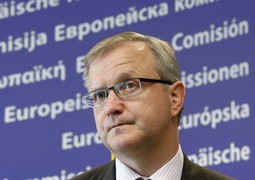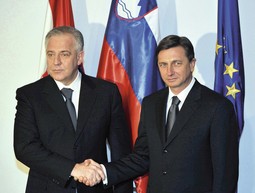Published in Nacional number 703, 2009-05-05
A new Croatian offer
Slovenia gets access to the open sea, but no territory
CROATIAN GOVERNMENT will, in the frame of an agreement on the Rehn proposal, offer Slovenia a liberal open seas regime, and would in return have its negotiations with the European Union unblocked
 PRESSURE ON SLOVENIA The proposal from Olli Rehn, the European Enlargement Commissioner, is very suitable for Croatia, but not for Slovenia, since in it Rehn also proposes that the issue of the border be separated from the issue of the regime that would govern access to the open seasThe Croatian Government is set to offer Slovenia a very liberal open seas regime, Nacional has learned from top national officials. The proposal was hammered out last week at the justice ministry, and after a meeting between Prime Minister Ivo Sanader, President Stipe Mesic and the leaders of the parties in Parliament, it will be officially submitted to Olli Rehn, who is endeavouring to resolve the Slovene-Croatian border dispute on behalf of the European Commission.
PRESSURE ON SLOVENIA The proposal from Olli Rehn, the European Enlargement Commissioner, is very suitable for Croatia, but not for Slovenia, since in it Rehn also proposes that the issue of the border be separated from the issue of the regime that would govern access to the open seasThe Croatian Government is set to offer Slovenia a very liberal open seas regime, Nacional has learned from top national officials. The proposal was hammered out last week at the justice ministry, and after a meeting between Prime Minister Ivo Sanader, President Stipe Mesic and the leaders of the parties in Parliament, it will be officially submitted to Olli Rehn, who is endeavouring to resolve the Slovene-Croatian border dispute on behalf of the European Commission.
Nacional's source says that Sanader's administration de facto entirely supports Rehn's latest initiative, which incorporates the chief Croatian demand, that being the unblocking of the negotiations with the EU. As a big step towards a compromise, Zagreb is also sending an offer of an open seas regime, which would provide Slovenia almost full rights in Piran Bay, but with an important note - without any kind of changes to borders. In concrete terms, Croatia will, by way of Brussels, offer Ljubljana completely unimpeded passage for all kinds of vessels, even submarines (even thought the Slovenians do not have any) and the ability to fly over the area. Cited as additional benefits are rights that are not mandatory in an open seas regime, and these are the rights to lay submarine cables and the possibility of an agreement on unimpeded fishing in the entire bay. In the opinion of top-ranking Government officials, this is the most that can be offered, and guarantees the Slovenes the greatest possible rights, without undermining Croatian territorial sovereignty in the process.
In the latest offer, Olli Rehn too is advocating that the question of the border be separate from the question of the regime that would govern access to the open sea. Besides, back in the mid 1990s, inter-governmental commissions analysed the border and agreed that 663 of the total 670 kilometres of border between the two countries were not contentious. At issue are only seven kilometres of border in Istria County and Slovenia has decided to block Croatian accession to the EU over less than one percent of the border, and tried to do the same during the accession to NATO. Likewise, both sides are in agreement that what is crucial is who controlled the disputed territory on 25 June 1991, and the majority of documents prove that it was Croatia.
 Croatian Prime Minister Ivo Sanader with his Slovenian counterpart Borut PahorSeen from the position of the Croatian national leadership, these are the best moments since the dispute started with Slovenia. Rehn's proposal, suitable to Croatia and almost not at all for Slovenia, is the basis for this optimistic mood. On Tuesday, as Nacional has learned, the opposition parties will also give their approval for this proposal, even though there is a conviction among them that Sanader is again presenting them with a fait accompli. "No one has yet shown us Rehn's proposal, and then forty of us are gathered in the same room, and we hear an explanation from the Government, which hides the facts to the last moment. The Slovenians are doing this more wisely, and meet frequently, and the result is an almost complete consensus on national policy, while here in Croatia the opposition has no insight into how things are developing," says a Social Democratic Party (SDP) official. In spite of his unhappiness, the Social Democrats will back Government, but their party leader Zoran Milanovic will not be at the meeting with the national leadership, as he will be participating at the time in election campaign activities in Istria County, and will instead be represented by Tonino Picula.
Croatian Prime Minister Ivo Sanader with his Slovenian counterpart Borut PahorSeen from the position of the Croatian national leadership, these are the best moments since the dispute started with Slovenia. Rehn's proposal, suitable to Croatia and almost not at all for Slovenia, is the basis for this optimistic mood. On Tuesday, as Nacional has learned, the opposition parties will also give their approval for this proposal, even though there is a conviction among them that Sanader is again presenting them with a fait accompli. "No one has yet shown us Rehn's proposal, and then forty of us are gathered in the same room, and we hear an explanation from the Government, which hides the facts to the last moment. The Slovenians are doing this more wisely, and meet frequently, and the result is an almost complete consensus on national policy, while here in Croatia the opposition has no insight into how things are developing," says a Social Democratic Party (SDP) official. In spite of his unhappiness, the Social Democrats will back Government, but their party leader Zoran Milanovic will not be at the meeting with the national leadership, as he will be participating at the time in election campaign activities in Istria County, and will instead be represented by Tonino Picula.
Unlike for the Slovenians, Rehn's decision to no longer mention the principle of justness in the process of making a decision very much suits Croatia. Instead, concerning Slovenia's contact with the open sea, there is mention of international law, good neighbourly relations, and only then of justness. The change is significant and tells of successful Croatian lobbying, which has managed to offset Slovenia's efforts to resolve the dispute on the basis of justness, even though not a single territorial dispute between countries has ever been addressed on the basis of this legal instrument.
The latest European Commission strategy is largely the result of irritation with Slovene policy. We need have no illusions that Croatia has many allies within the EU, but over the past six months the government led by Borut Pahor is leading an explicitly anti-European policy, and has succeeded in getting on everyone's nerves in the Union. It has been emphasised countless times that there are several dozen unresolved border issues within the EU, but not a single country, with the exception of Slovenia, has used these kinds of situation to blackmail others. Besides, in Brussels the thinking is on the long-term and they are aware that the legalisation of the Slovene blockade of the negotiations could in the future create even worse problems.
In a few years, negotiations will be launched between the European Union and Serbia, Macedonia, Bosnia & Herzegovina, and then there is Montenegro, Albania and Kosovo. If the Slovene blockade is accepted, there will be no reason for Croatia not to do the same towards Serbia and Bosnia & Herzegovina. Strategically, the negotiations with Turkey are even more important, and problems could really start then if Greece decides to block the negotiation over a couple of contentious islands or their maritime border.
Because of these dangers, the behaviour of the Slovenians has for months had virtually no support within the European Union, and in a recent interview Rehn stated that he was "at the end of his own creativity" in resolving the Slovenian-Croatian problem. "There is no exact date as a deadline, but I think that these two countries need to provide their answer in the first half of May. I expect a positive reaction to our compromise proposal, because in the meantime my own creativity and event the European Commission's legal services have been 'irritated', and that means something. I hope that these two countries will now overcome the 'final stretch' and come to an agreement," said Olli Rehn.
The European Enlargement Commissioner explained that there was an interest among EU member countries to see the matter resolved, with a message to Slovenia that "no one should frivolously put it all at stake. There is a similar feeling in the majority of European countries, although in Germany, for example, they do not share the optimism of the Austrian Foreign Minister Michael Spindelegger, who said that the blockade would be over in the coming two to three weeks. An experienced German diplomat, who has asked not to be named, told Nacional that Slovenia could block the negotiations right through to the autumn.
The reason is in the upcoming elections for European Parliament, to be held from 4 to 7 June of this year. All three of the leading party blocks: Christian democrats, socialists and liberals, have launched their campaigns, and over the coming month the majority of political activity will be related to the June elections. The results are then to be tallied and preparations made for the election of the future European Commission, and that will at least in part marginalise the continuation of the negotiations between Croatia and the EU.
 A CROATIAN SOLUTION TO THE DISPUTE Croatian Foreign Minister Gordan Jandrokovic met with Olli Rehn in Luxembourg in late April; Croatian Government will soon submit to Rehn its proposal to resolve the border dispute with SloveniaThis situation suits Slovenia because Pahor's government is facing massive problems, which even the opposition says could not have been expected during last year's elections. At this point in time, Pahor faces three major problems. The first are strong disagreements within the ruling coalition on personnel issues in state-owned companies and services, which have resulted in frequent conflicts between Gregor Golobic, the leader of the Zares party, and Katarina Kresal, the head of the Liberal Democrats in the current government. The second is the recession and an unexpectedly deep economic crisis, which has brought until recently leading firms such as Istrabenz, the Lasko brewery, MIP and Revoz to the brink of disaster.
A CROATIAN SOLUTION TO THE DISPUTE Croatian Foreign Minister Gordan Jandrokovic met with Olli Rehn in Luxembourg in late April; Croatian Government will soon submit to Rehn its proposal to resolve the border dispute with SloveniaThis situation suits Slovenia because Pahor's government is facing massive problems, which even the opposition says could not have been expected during last year's elections. At this point in time, Pahor faces three major problems. The first are strong disagreements within the ruling coalition on personnel issues in state-owned companies and services, which have resulted in frequent conflicts between Gregor Golobic, the leader of the Zares party, and Katarina Kresal, the head of the Liberal Democrats in the current government. The second is the recession and an unexpectedly deep economic crisis, which has brought until recently leading firms such as Istrabenz, the Lasko brewery, MIP and Revoz to the brink of disaster.
There is a possibility that top tycoons such as Igor Bavcar and Bosko Srot be brought to trial, and a scandal has surfaced these days concerning the illegal dealings of the Mercator Company while the current Mayor of Ljubljana, Zoran Jankovic, was running it. Jankovic was reputed to be a very successful entrepreneur and the victim of revanchism on the part of the former Jansa government, and if it is shown that he operated illegally it will be yet another blow to the Pahor administration with which he is quite close.
The third not easily resolved problem for Slovenian policy makers is the dispute with Croatia. However much some of the objections concerning Croatia's responsibility coming from Ljubljana stand, such as the senseless insistence on a protected ecological and fishing zone, by far the greatest responsibility for the current crisis is borne by Ljubljana. Janez Jansa and Dimitrij Rupel completely politicised the issue of Piran Bay, and turned the entire issue into one of national pride, so that no one now is dealing in terms of rational argumentation. Among today's Slovene politicians there is literally not a single relevant representative that would accept a resolution of the dispute before the International Court of Justice, and the opinions are similar among the "right wing" Rupel or Marjan Podobnik and the left wing-liberal Pahor and Ivo Vajgl.
A few months ago Slovenian parliament adopted a decision claiming complete jurisdiction over all of Piran Bay, which further complicates the resolution of this issue. There was an attempt to prevent the ratification of the accession of Croatia to NATO, although Ljubljana backed down on that issue after getting a strong warning from the USA. A similar warning has not come from the EU, even though all of the leading member countries and their politicians are stating a position in principle that bilateral disagreements should not be the cause for a blockade.
 LEGAL EXPERT Davor Vidas is one of the candidates to serve as a judge on an arbitration tribunalIn this situation Rehn's proposal is the latest diplomatic pressure on Slovenia, in which Pahor is trying to buy time. That is why he is travelling to Sweden and Finland this week, while on the domestic front he is carrying out broad consultations with other political parties. The dilemma he has to resolve is not an easy one - rejection would further degrade Slovenia's standing within the EU, while accepting it would lead to public outrage. Jansa could help him by rejecting Rehn's proposal and pre-empting a vote in parliament, but it also does not work to the advantage of the former Prime Minister to take on the role of the chief opponent of the common European Union policy. But the essence of the proposal out of Brussels negates everything Slovenian policy makers are demanding, and according to Nacional's source in Ljubljana, Pahor will on Wednesday propose an amendment that would guarantee Slovenia a point of contact with the open sea. If Croatia and Rehn accept this demand, then Slovenian parliament will support the latest initiative.
LEGAL EXPERT Davor Vidas is one of the candidates to serve as a judge on an arbitration tribunalIn this situation Rehn's proposal is the latest diplomatic pressure on Slovenia, in which Pahor is trying to buy time. That is why he is travelling to Sweden and Finland this week, while on the domestic front he is carrying out broad consultations with other political parties. The dilemma he has to resolve is not an easy one - rejection would further degrade Slovenia's standing within the EU, while accepting it would lead to public outrage. Jansa could help him by rejecting Rehn's proposal and pre-empting a vote in parliament, but it also does not work to the advantage of the former Prime Minister to take on the role of the chief opponent of the common European Union policy. But the essence of the proposal out of Brussels negates everything Slovenian policy makers are demanding, and according to Nacional's source in Ljubljana, Pahor will on Wednesday propose an amendment that would guarantee Slovenia a point of contact with the open sea. If Croatia and Rehn accept this demand, then Slovenian parliament will support the latest initiative.
The problem is that Croatia can hardly respond positively to that demand. Davor Vidas confirmed this after his meeting with President Stjepan Mesic, warning that if the Slovenian demand for contact with the open sea was accepted it would violate all international conventions and regulations. President Mesic is of a similar opinion, and is opposed to the a priori acceptance of what Olli Rehn is offering.
But, as former minister and leading Slovenian political consultant Borut Suklje says, "This is Rehn's last chance to remain a European commissioner, and that is why he will do everything to succeed. When he gets the amendments from Zagreb and Ljubljana, he will consider them a further twenty days or so and submit his final proposal in late May, which will largely determine the status of Croatia and Slovenia, but also his own political future, which is not a negligible fact," says Suklje.
When is comes to the Slovenian reaction to the new proposal from Olli Rehn, the key role could be played by former Slovenian Prime Minister Janez Jansa, who is now the president of the Slovenian Democratic Party. If, namely, the current Slovenian Prime Minister Borut Pahor was to reject the Rehn proposal, it would further degrade Slovenia's status within the EU, while accepting the proposal would provoke a public outcry. Jansa could help him in this regard, as his rejection of the Rehn proposal would pre-empt a vote in parliament, But, it also does not work to the advantage of the former Prime Minister to take on the role of the chief opponent of the common European Union policy.
Related articles
China's CACGC wants to build the Zagreb Airport
Diplomatic and economic relations between Croatia and China are intensifying, with new interest of Chinese companies to invest in Croatia, which was… Više
Latest news
-
28.10.2010. / 14:15
'A profitable INA is in everyone's interest'
-
28.10.2010. / 09:38
Sanader’s eight fear SDP — Won’t bring down Government
-
21.10.2010. / 15:02
Interior Ministry turned a blind eye on Pukanic assassination
-
20.10.2010. / 09:34
Barisic could bankrupt HDZ




